-
 Bitcoin
Bitcoin $103,769.0031
0.12% -
 Ethereum
Ethereum $2,524.4182
7.02% -
 Tether USDt
Tether USDt $1.0000
0.00% -
 XRP
XRP $2.3846
0.14% -
 BNB
BNB $660.7056
-0.10% -
 Solana
Solana $174.5645
1.62% -
 USDC
USDC $0.9997
-0.03% -
 Dogecoin
Dogecoin $0.2349
6.02% -
 Cardano
Cardano $0.8040
1.82% -
 TRON
TRON $0.2642
0.32% -
 Sui
Sui $3.9935
0.45% -
 Chainlink
Chainlink $16.7613
3.20% -
 Avalanche
Avalanche $24.9522
4.79% -
 Stellar
Stellar $0.3082
1.90% -
 Shiba Inu
Shiba Inu $0.0...01617
3.92% -
 Hedera
Hedera $0.2096
1.89% -
 Toncoin
Toncoin $3.4185
2.55% -
 Bitcoin Cash
Bitcoin Cash $413.4224
-0.84% -
 Hyperliquid
Hyperliquid $24.5231
-1.47% -
 Polkadot
Polkadot $5.0774
-0.09% -
 Litecoin
Litecoin $102.6722
-1.07% -
 UNUS SED LEO
UNUS SED LEO $8.3203
-4.14% -
 Pi
Pi $0.9420
27.97% -
 Monero
Monero $323.3621
2.94% -
 Bitget Token
Bitget Token $4.9759
4.72% -
 Pepe
Pepe $0.0...01302
1.63% -
 Dai
Dai $0.9998
-0.04% -
 Ethena USDe
Ethena USDe $1.0001
0.00% -
 Uniswap
Uniswap $7.1504
10.15% -
 NEAR Protocol
NEAR Protocol $3.2797
10.09%
What is the difference between Ripple and traditional cryptocurrencies?
Ripple (XRP) prioritizes speed and efficiency for institutional payments, contrasting with the decentralized, censorship-resistant approach of Bitcoin and Ethereum, leading to differing regulatory landscapes and user bases.
Mar 09, 2025 at 10:22 am
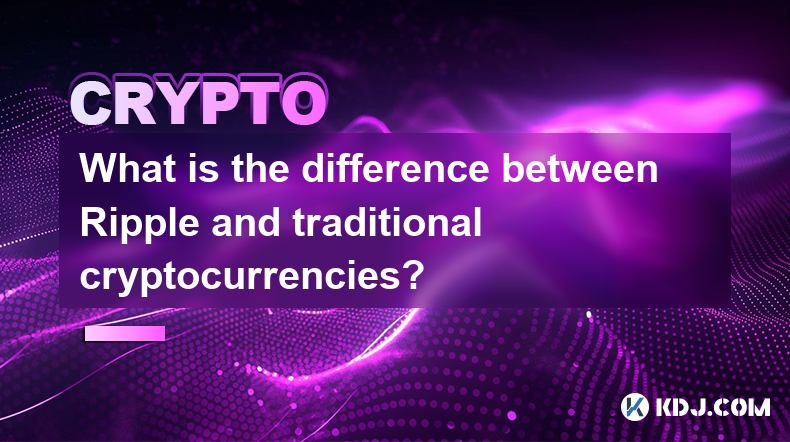
Key Points:
Ripple (XRP) functions differently than most cryptocurrencies due to its centralized nature and intended use as a bridge currency for international payments.
Traditional cryptocurrencies like Bitcoin and Ethereum prioritize decentralization and utilize blockchain technology for peer-to-peer transactions.
Ripple's speed and lower transaction fees make it attractive for institutional use, contrasting with the often slower and more expensive transactions of many other cryptocurrencies.
Regulatory uncertainty surrounding Ripple adds complexity, while traditional cryptocurrencies face their own regulatory challenges.
The core difference lies in their design philosophy: Ripple prioritizes speed and efficiency for institutional payments, while traditional cryptocurrencies prioritize decentralization and censorship resistance.
What is the difference between Ripple and traditional cryptocurrencies?
The cryptocurrency landscape is vast and diverse, with Ripple (XRP) occupying a unique niche distinct from the majority of "traditional" cryptocurrencies like Bitcoin (BTC) and Ethereum (ETH). Understanding this distinction requires examining their fundamental designs and intended purposes. The core difference boils down to centralization versus decentralization, and the resulting implications for functionality and regulatory scrutiny.
Traditional cryptocurrencies, exemplified by Bitcoin and Ethereum, are built on the principle of decentralization. This means no single entity controls the network; instead, it’s governed by a distributed network of nodes, enhancing security and censorship resistance. Transactions are recorded on a public, immutable blockchain accessible to anyone. This decentralized structure is often cited as a key strength, promoting transparency and trust. However, this decentralization can also lead to slower transaction speeds and higher fees, especially during periods of high network activity.
Ripple, on the other hand, operates on a different model. While it uses a distributed ledger technology, it’s significantly more centralized than Bitcoin or Ethereum. Ripple Labs, the company behind XRP, maintains considerable control over the network. This centralized approach allows for faster transaction speeds and lower fees, making it attractive for institutional clients seeking efficient cross-border payments. This speed and efficiency are achieved through RippleNet, a payment network that utilizes XRP as a bridge currency to facilitate faster and cheaper transactions between different financial institutions.
The difference in transaction speed is a crucial distinction. Bitcoin transactions can take minutes or even hours to confirm, while Ethereum transactions, depending on network congestion, can also experience delays. Ripple, however, boasts significantly faster transaction times, often completing transactions within seconds. This speed advantage is a major draw for financial institutions looking to streamline international payments.
Transaction fees also differ substantially. Bitcoin and Ethereum transaction fees can fluctuate wildly based on network demand, sometimes reaching exorbitant levels. Ripple's fees, however, are typically much lower and more predictable, making it a cost-effective solution for high-volume transactions.
Regulatory landscape is another key area of divergence. Traditional cryptocurrencies face ongoing regulatory uncertainty globally, with governments grappling with how to classify and regulate these decentralized assets. Ripple, due to its centralized nature and association with a specific company, faces a different set of regulatory challenges. The ongoing legal battle between Ripple Labs and the Securities and Exchange Commission (SEC) highlights the complexities and uncertainties inherent in the regulatory environment surrounding XRP.
The target user base also differs significantly. Traditional cryptocurrencies are often adopted by individuals seeking alternative financial systems, decentralized applications, or investment opportunities. Ripple, conversely, primarily targets financial institutions and businesses seeking to improve their cross-border payment systems. Its focus is on providing a faster, more efficient, and lower-cost solution for institutional clients.
This difference in focus leads to a divergence in technological implementation. Traditional cryptocurrencies often incorporate complex consensus mechanisms, such as Proof-of-Work (PoW) or Proof-of-Stake (PoS), to secure the network and validate transactions. Ripple utilizes a unique consensus mechanism tailored for speed and efficiency, optimizing its network for institutional use cases.
The underlying philosophy behind each type of cryptocurrency is fundamentally different. Traditional cryptocurrencies prioritize decentralization, security, and censorship resistance, often at the expense of speed and scalability. Ripple prioritizes speed, efficiency, and cost-effectiveness, particularly for institutional transactions, potentially compromising some aspects of decentralization.
Frequently Asked Questions:
Q: Is Ripple a cryptocurrency?
A: Yes, XRP is considered a cryptocurrency, although its centralized nature and intended use differ significantly from many other cryptocurrencies.
Q: Is Ripple better than Bitcoin?
A: There's no single "better" cryptocurrency. The choice depends on individual needs and priorities. Ripple excels in speed and efficiency for institutional payments, while Bitcoin prioritizes decentralization and security.
Q: Is XRP a security?
A: This is a complex legal question currently being litigated. The SEC claims XRP is a security, while Ripple Labs argues it is not. The outcome of this case will significantly impact the regulatory landscape surrounding XRP.
Q: How does Ripple work compared to other cryptocurrencies?
A: Ripple utilizes a unique consensus mechanism and a centralized network design, optimizing for speed and efficiency in cross-border payments, unlike the decentralized approach of most other cryptocurrencies.
Q: What are the advantages and disadvantages of Ripple compared to traditional cryptocurrencies?
A: Advantages: Faster transactions, lower fees, suited for institutional use. Disadvantages: Centralized nature, regulatory uncertainty, less censorship resistance.
Disclaimer:info@kdj.com
The information provided is not trading advice. kdj.com does not assume any responsibility for any investments made based on the information provided in this article. Cryptocurrencies are highly volatile and it is highly recommended that you invest with caution after thorough research!
If you believe that the content used on this website infringes your copyright, please contact us immediately (info@kdj.com) and we will delete it promptly.
- Pi Coin ($PI) is Rallying as It Approaches the $1 Mark, Showing Strong Momentum With a 34% Surge in the Last 24 Hours
- 2025-05-11 14:30:13
- Top 6 Meme Coins in May 2025: Why Arctic Pablo Coin Is Freezing Out the Competition
- 2025-05-11 14:30:13
- Coinbase acquires Deribit for $2.9B, the largest M&A event in cryptocurrency history.
- 2025-05-11 14:25:12
- FLOKI Emerges as a Utility-Driven Ecosystem, Standing Out Not Just as a Meme Coin but Also as a Real-World Use-Case Driven Project
- 2025-05-11 14:25:12
- The Solana price jumped 5% in the past 24 hours to trade at $171.80
- 2025-05-11 14:20:13
- LDO's Next Phase of Evolution: The Dual Governance Mechanism
- 2025-05-11 14:20:13
Related knowledge
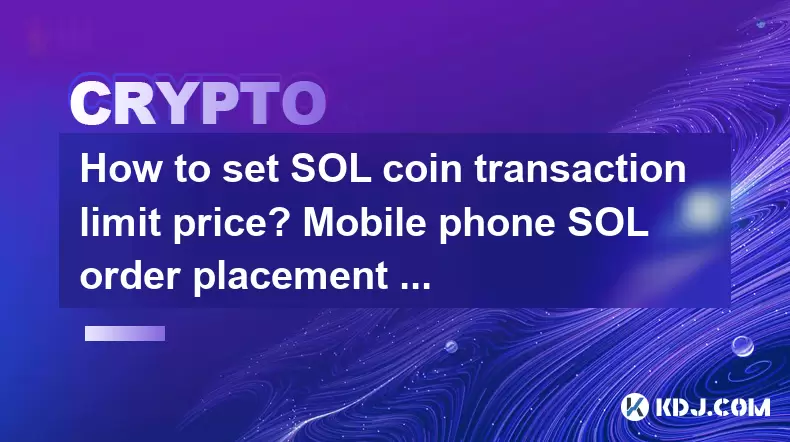
How to set SOL coin transaction limit price? Mobile phone SOL order placement skills analysis
May 10,2025 at 09:56am
How to Set SOL Coin Transaction Limit Price? Mobile Phone SOL Order Placement Skills Analysis Setting a transaction limit price for Solana (SOL) coins on a mobile device can be a crucial skill for any crypto trader looking to optimize their trading strategy. This article will guide you through the process of setting a limit price for SOL transactions on...
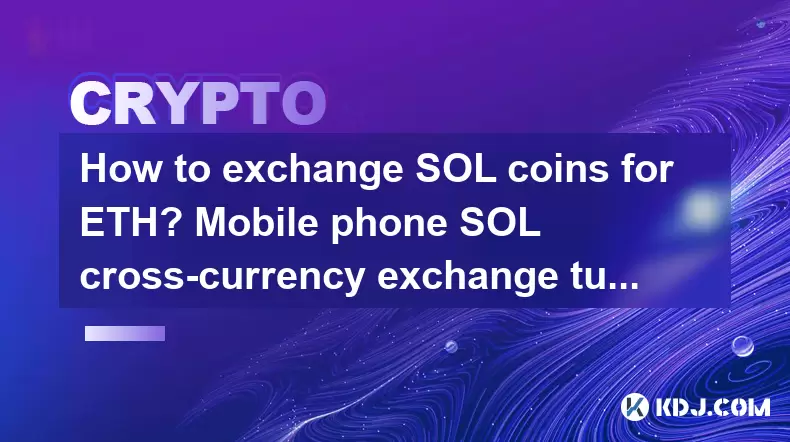
How to exchange SOL coins for ETH? Mobile phone SOL cross-currency exchange tutorial
May 11,2025 at 02:49am
Exchanging SOL coins for ETH on a mobile phone can be a straightforward process if you follow the right steps and use a reliable platform. This tutorial will guide you through the process of converting your Solana (SOL) to Ethereum (ETH) using a mobile app, ensuring you can manage your cryptocurrency portfolio efficiently and securely. Choosing the Righ...
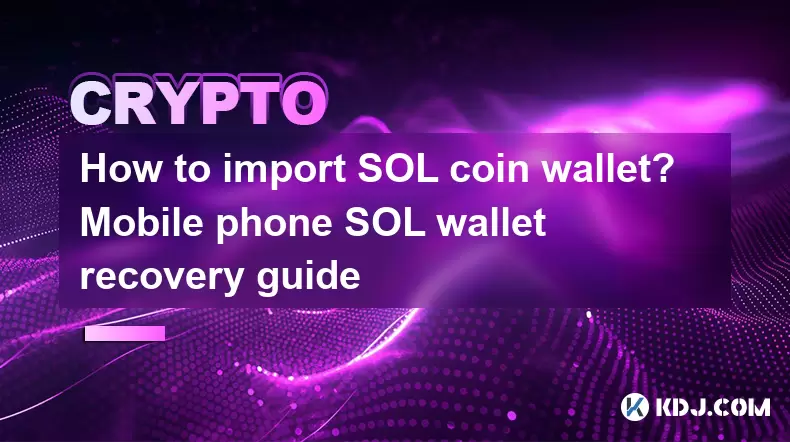
How to import SOL coin wallet? Mobile phone SOL wallet recovery guide
May 10,2025 at 05:22pm
Introduction to SOL Coin and Its WalletSOL is the native cryptocurrency of the Solana blockchain, known for its high throughput and low transaction costs. Managing your SOL coins requires a secure wallet, and understanding how to import and recover your SOL wallet on a mobile device is crucial for maintaining access to your funds. This guide will walk y...
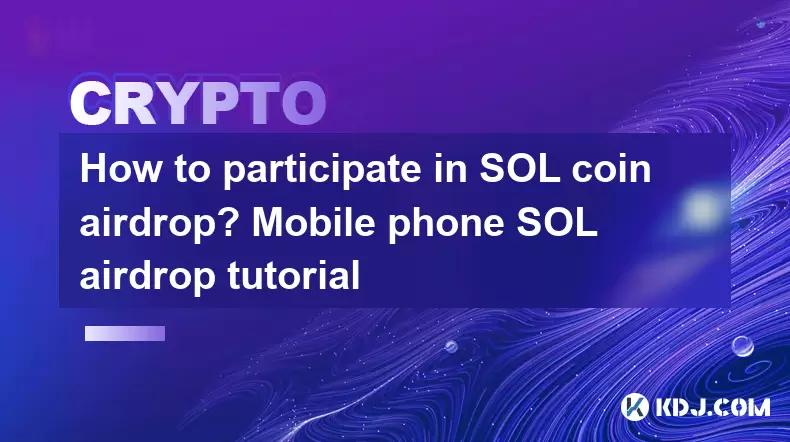
How to participate in SOL coin airdrop? Mobile phone SOL airdrop tutorial
May 11,2025 at 08:56am
Participating in a SOL (Solana) coin airdrop can be an exciting way to earn free cryptocurrency. Airdrops are events where projects distribute free tokens to users as a way to promote their blockchain or cryptocurrency. In this tutorial, we'll guide you through the steps to participate in a SOL coin airdrop using your mobile phone. Understanding SOL Air...
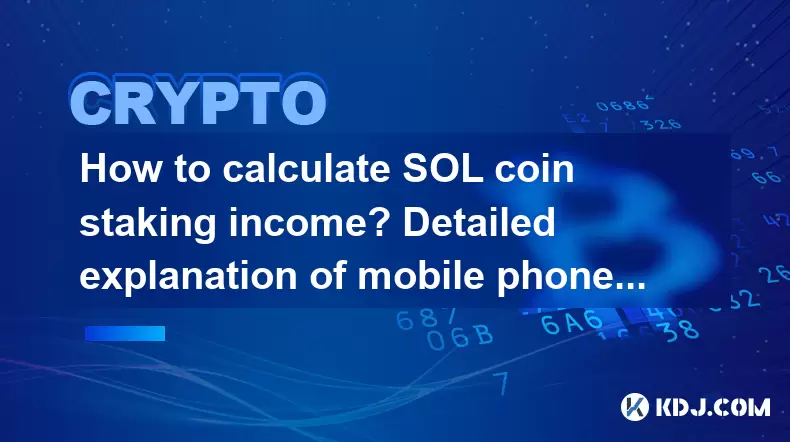
How to calculate SOL coin staking income? Detailed explanation of mobile phone SOL staking steps
May 10,2025 at 06:21am
How to Calculate SOL Coin Staking Income? Detailed Explanation of Mobile Phone SOL Staking Steps Staking has become a popular way for cryptocurrency holders to earn passive income, and Solana (SOL) is no exception. In this article, we will delve into the specifics of calculating SOL coin staking income and provide a detailed guide on how to stake SOL us...

How to set up SOL coin fixed investment? Mobile phone automated SOL investment tutorial
May 11,2025 at 07:36am
Setting up a fixed investment in SOL (Solana) coin using your mobile phone can be a strategic way to build your cryptocurrency portfolio over time. This tutorial will guide you through the process of setting up an automated investment plan for SOL using a mobile app, ensuring you can invest consistently without the need for daily monitoring. Choosing th...

How to set SOL coin transaction limit price? Mobile phone SOL order placement skills analysis
May 10,2025 at 09:56am
How to Set SOL Coin Transaction Limit Price? Mobile Phone SOL Order Placement Skills Analysis Setting a transaction limit price for Solana (SOL) coins on a mobile device can be a crucial skill for any crypto trader looking to optimize their trading strategy. This article will guide you through the process of setting a limit price for SOL transactions on...

How to exchange SOL coins for ETH? Mobile phone SOL cross-currency exchange tutorial
May 11,2025 at 02:49am
Exchanging SOL coins for ETH on a mobile phone can be a straightforward process if you follow the right steps and use a reliable platform. This tutorial will guide you through the process of converting your Solana (SOL) to Ethereum (ETH) using a mobile app, ensuring you can manage your cryptocurrency portfolio efficiently and securely. Choosing the Righ...

How to import SOL coin wallet? Mobile phone SOL wallet recovery guide
May 10,2025 at 05:22pm
Introduction to SOL Coin and Its WalletSOL is the native cryptocurrency of the Solana blockchain, known for its high throughput and low transaction costs. Managing your SOL coins requires a secure wallet, and understanding how to import and recover your SOL wallet on a mobile device is crucial for maintaining access to your funds. This guide will walk y...

How to participate in SOL coin airdrop? Mobile phone SOL airdrop tutorial
May 11,2025 at 08:56am
Participating in a SOL (Solana) coin airdrop can be an exciting way to earn free cryptocurrency. Airdrops are events where projects distribute free tokens to users as a way to promote their blockchain or cryptocurrency. In this tutorial, we'll guide you through the steps to participate in a SOL coin airdrop using your mobile phone. Understanding SOL Air...

How to calculate SOL coin staking income? Detailed explanation of mobile phone SOL staking steps
May 10,2025 at 06:21am
How to Calculate SOL Coin Staking Income? Detailed Explanation of Mobile Phone SOL Staking Steps Staking has become a popular way for cryptocurrency holders to earn passive income, and Solana (SOL) is no exception. In this article, we will delve into the specifics of calculating SOL coin staking income and provide a detailed guide on how to stake SOL us...

How to set up SOL coin fixed investment? Mobile phone automated SOL investment tutorial
May 11,2025 at 07:36am
Setting up a fixed investment in SOL (Solana) coin using your mobile phone can be a strategic way to build your cryptocurrency portfolio over time. This tutorial will guide you through the process of setting up an automated investment plan for SOL using a mobile app, ensuring you can invest consistently without the need for daily monitoring. Choosing th...
See all articles






















































































